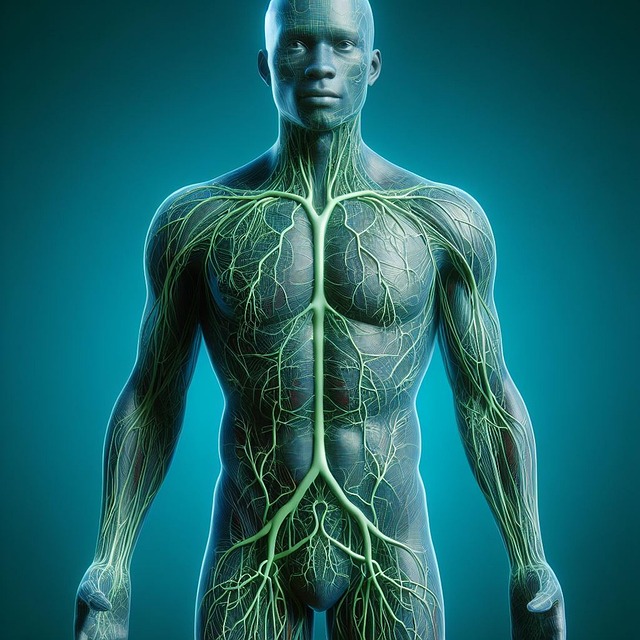The Endocannabinoid System (ECS) is a recently discovered physiological network crucial for maintaining homeostasis in mammals, including humans. It consists of endocannabinoids, natural lipids produced by the body, and cannabinoid receptors that regulate various functions such as pain sensation, appetite, mood, memory, and immune response. Unveiling the intricacies of this system has revolutionized scientific understanding of self-regulation and opened new paths in medical research and treatment, particularly in neuroscience and chronic pain management. Understanding the ECS is essential for developing targeted therapies for numerous health conditions.
The endocannabinoid system (ECS) is a complex biological network found in all mammals, playing a pivotal role in maintaining homeostasis. This intricate system involves cannabinoids, endocannabinoids, and specific receptors—CB1 and CB2—spread throughout the body. By regulating various physiological processes, ECS ensures optimal health and balance. This article delves into the depths of understanding the endocannabinoid system, exploring its functions, impact, and potential therapeutic applications, with a focus on recent research and its implications for mammalian biology and medicine.
What is the Endocannabinoid System?

The Endocannabinoid System (ECS) is a complex physiological system found in all mammals, including humans, that plays a crucial role in maintaining homeostasis—the body’s internal balance. It was discovered relatively recently and has sparked significant interest in scientific circles due to its profound impact on various bodily functions. The ECS consists of endocannabinoids, which are endogenous lipids (fats) produced by the body, and cannabinoid receptors located throughout the brain and body.
Endocannabinoids act as natural chemicals that bind to these receptors, modulating neural communication and influencing processes such as pain sensation, appetite, mood, memory, and immune response. The discovery of this system has revolutionized our understanding of how the body regulates itself and has opened up new avenues for medical research and treatment, particularly in areas like neuroscience and chronic pain management.
The Role of Cannabinoids in the Body

Endocannabinoid Receptors: CB1 and CB2

The endocannabinoid system (ECS) is a complex biological system that plays a crucial role in maintaining homeostasis, or balance, within the body. At its core are endocannabinoids, which are endogenous compounds meaning they’re naturally produced by our bodies. These molecules interact with specific receptors to regulate various physiological processes, including appetite, mood, memory, and pain perception. Two of the most well-studied receptors in this system are CB1 and CB2.
CB1 receptors are predominantly found in the brain and central nervous system, making them integral to cognitive functions like memory, pleasure, and motor control. On the other hand, CB2 receptors are primarily located in the immune system and peripheral organs, suggesting their involvement in immune responses, inflammation, and pain modulation outside the central nervous system. Understanding these receptors and their interactions offers significant insights into the complex functioning of the ECS and its potential implications for various health conditions.
How Does the ECS Regulate Homeostasis?

The Endocannabinoid System (ECS) is a complex cellular communication system that plays a pivotal role in maintaining homeostasis, or balance, within the body. It’s a network of cannabinoid receptors, enzymes, and endocannabinoids that help regulate various physiological processes. By binding to these receptors, endocannabinoids can modulate everything from appetite and pain perception to mood and memory formation. This intricate system acts as a kind of internal ‘homeostat’ keeping our bodies in check.
Understanding the ECS is crucial because it’s involved in so many aspects of our health. Imbalances in the ECS have been linked to numerous conditions, including chronic pain, anxiety disorders, and metabolic diseases. By recognizing the ECS’s role in homeostasis, researchers can develop more targeted therapies that interact with this system, potentially offering new relief options for a wide range of health issues.
The Impact of Cannabis on the ECS

The cannabis plant contains over 100 chemical compounds known as cannabinoids, with two primary ones being THC and CBD. When consumed, these compounds interact with the body’s Endocannabinoid System (ECS), a complex network of receptors found throughout the nervous system and other organs. Understanding the ECS is crucial in comprehending the impact of cannabis. This system plays a vital role in maintaining homeostasis—the body’s internal balance—regulating various physiological processes including mood, memory, pain perception, appetite, and inflammation.
The ECS is comprised of endocannabinoids (produced by the body), receptors (CB1 and CB2), and enzymes that break down endocannabinoids. Cannabinoids from cannabis bind to these receptors, mimicking the action of endocannabinoids. This interaction can lead to therapeutic effects, such as reduced anxiety and pain. However, excessive activation or disruption of the ECS may also cause adverse reactions. Thus, the impact of cannabis on the ECS is a complex interplay that requires further study to fully comprehend its potential benefits and risks.
Therapeutic Potential of the Endocannabinoid System

The Endocannabinoid System (ECS) is a fascinating and intricate network present in all mammals, playing a pivotal role in maintaining homeostasis—the body’s internal balance. This system consists of endocannabinoids, receptors, and enzymes that work together to regulate various physiological processes. Beyond its well-known involvement in appetite, memory, and pleasure, the ECS has garnered significant interest for its potential therapeutic applications.
Research suggests that modulating the ECS could offer relief for a range of conditions, from chronic pain and inflammation to anxiety and neurodegenerative diseases. The ability of endocannabinoids to interact with their receptors suggests a natural regulatory mechanism within the body, providing a promising avenue for developing novel treatments. Understanding the ECS opens doors to innovative therapies, offering hope for improved health and quality of life for many individuals.
Research and Studies on ECS in Mammals

Disorders Linked to Endocannabinoid Dysfunction

The endocannabinoid system (ECS) is a complex biological system found in all mammals, playing a crucial role in maintaining homeostasis, or balance within the body. Understanding the ECS is essential as its dysfunction has been linked to various disorders. This intricate system involves endocannabinoids, which are endogenous lipids that bind to specific receptors, and enzymes responsible for their synthesis and degradation. When out of balance, this system can contribute to conditions such as chronic pain, anxiety, depression, and inflammation.
Research suggests that endocannabinoid dysfunction may underlie the pathophysiology of numerous diseases. For instance, reduced levels of endocannabinoids or alterations in receptor function have been associated with multiple sclerosis, Parkinson’s disease, and Alzheimer’s disease. Moreover, the ECS is implicated in regulating appetite, metabolism, immune response, and even reproductive functions, highlighting its central role in overall health and well-being.
Future Insights into the Endocannabinoid System

The endocannabinoid system (ECS) is a complex network of cell receptors, endocannabinoids, and enzymes that play a crucial role in maintaining homeostasis in mammals. By regulating various physiological processes, including pain perception, appetite, mood, memory, and immune function, the ECS acts as a sophisticated internal communication system within the body. With its involvement in such diverse functions, a deeper understanding of the ECS offers immense potential for future medical insights and therapeutic applications.
Research into the ECS is constantly evolving, shedding light on its intricate interactions with different pathways and organs. This knowledge can lead to the development of novel treatments for conditions ranging from chronic pain and inflammation to mental health disorders and neurodegenerative diseases. By harnessing the power of the endocannabinoid system, scientists may unlock new avenues for addressing some of the most challenging healthcare issues facing mammals today.
